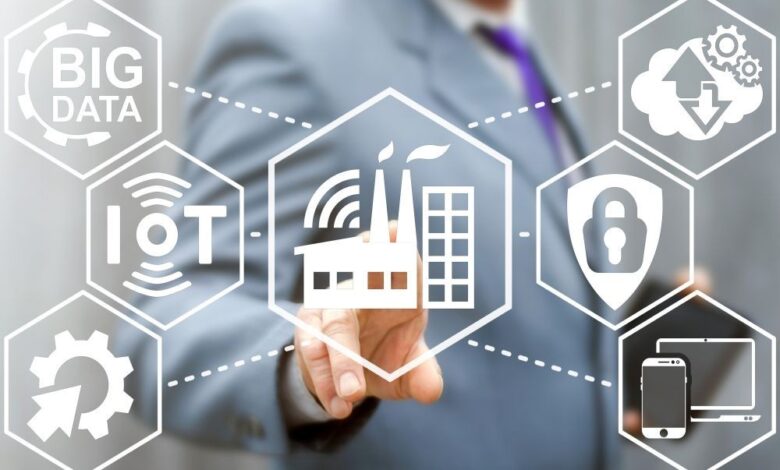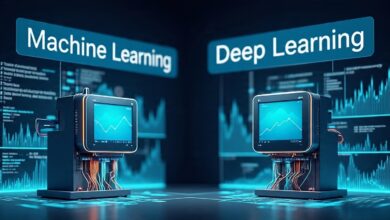
The role of IoT in industrial automation is transforming the manufacturing landscape, enabling smarter operations, real-time data collection, and seamless connectivity. IoT devices allow industries to optimize production, reduce downtime, and improve overall efficiency by integrating machines, sensors, and analytics into a unified system. As businesses aim for operational excellence, IoT technology has become indispensable for creating agile and data-driven industrial environments.
Industries worldwide are embracing the role of IoT in industrial automation to stay competitive in an increasingly digital economy. From predictive maintenance to supply chain optimization, IoT-powered solutions are enhancing decision-making and resource management. This article delves into the various applications and benefits of IoT in industrial automation, showcasing its impact on productivity, sustainability, and innovation.
Read More: The Role of IoT in Industrial Automation
Real-Time Monitoring and Data Collection in Industrial Operations
The role of IoT in industrial automation is evident through real-time monitoring and data collection for operational efficiency.
IoT sensors gather real-time data on equipment performance, production rates, and environmental conditions. This information empowers managers to identify inefficiencies, make timely adjustments, and enhance productivity across industrial processes.
Predictive Maintenance Using IoT
Predictive maintenance illustrates the role of IoT in industrial automation by minimizing unplanned downtime and extending equipment life.
IoT sensors track machine health indicators such as vibration, temperature, and pressure. Advanced analytics predict potential failures, enabling timely maintenance that prevents costly disruptions.
IoT-Driven Energy Management in Industries
The role of IoT in industrial automation extends to energy management, optimizing consumption and reducing costs.
Connected devices monitor energy use across facilities, identifying inefficiencies and suggesting improvements. Automated systems adjust energy usage dynamically, aligning with production demands and sustainability goals.
Supply Chain Optimization with IoT
The role of IoT in industrial automation is evident in supply chain management, ensuring seamless operations and timely deliveries.
IoT-enabled tracking devices provide real-time visibility of shipments and inventory levels. These systems enhance logistics efficiency, reduce delays, and improve customer satisfaction by ensuring accurate delivery timelines.
Quality Control and Assurance Through IoT
IoT revolutionizes quality control, demonstrating its role in industrial automation by ensuring consistent and high-quality production.
Sensors monitor production parameters like temperature, pressure, and material consistency. Real-time alerts identify deviations, enabling immediate corrective actions that maintain product standards and reduce waste.
IoT in Industrial Robotics
The role of IoT in industrial automation is evident in robotics, enhancing precision and productivity in manufacturing processes.
IoT-connected robots perform complex tasks with high accuracy and minimal human intervention. These systems adapt to real-time data, ensuring flexibility and efficiency in assembly lines and other operations.
Enhanced Safety with IoT in Industrial Settings
IoT highlights its role in industrial automation by improving workplace safety through connected devices and monitoring systems.
Wearables and sensors detect hazardous conditions such as gas leaks, heat exposure, or equipment malfunctions. Automated alerts enable timely interventions, ensuring employee safety and compliance with regulations.
Smart Factories Powered by IoT
The role of IoT in industrial automation is central to the concept of smart factories, which optimize every aspect of production.
IoT-enabled systems integrate machines, processes, and analytics to create self-regulating environments. These factories enhance efficiency, reduce costs, and adapt to dynamic market demands effortlessly.
Remote Monitoring and Control of Industrial Processes
IoT enables remote monitoring, showcasing its role in industrial automation by improving accessibility and operational oversight.
Managers can monitor production lines, equipment status, and environmental conditions from anywhere using IoT dashboards. This connectivity ensures real-time decision-making and uninterrupted operations.
Inventory Management Using IoT
Inventory management benefits from the role of IoT in industrial automation, ensuring efficient stock control and reducing wastage.
Connected systems track inventory levels, usage patterns, and shelf life. Automated alerts prevent overstocking or shortages, optimizing inventory handling and reducing operational costs.
IoT in Industrial Maintenance Scheduling
Maintenance scheduling highlights the role of IoT in industrial automation by streamlining processes and minimizing downtime.
IoT platforms analyze machine data to recommend optimal maintenance schedules. These systems ensure equipment reliability, extend lifespan, and reduce costs associated with reactive maintenance.
IoT for Industrial Equipment Tracking
Equipment tracking exemplifies the role of IoT in industrial automation, improving asset visibility and utilization.
Connected tags and sensors track the location and condition of machinery. This data ensures efficient resource allocation, reduces equipment loss, and enhances productivity.
IoT in Environmental Monitoring for Industries
The role of IoT in industrial automation extends to environmental monitoring, ensuring compliance with sustainability standards.
IoT sensors track air quality, emissions, and waste levels, enabling industries to reduce their environmental footprint. These systems support eco-friendly operations and regulatory compliance.
IoT in Additive Manufacturing (3D Printing)
Additive manufacturing benefits from the role of IoT in industrial automation, enabling precision and innovation in production.
IoT-connected 3D printers monitor and control printing parameters in real time. These systems enhance accuracy, reduce material waste, and enable on-demand production of customized components.
IoT in Industrial Cybersecurity
Cybersecurity underscores the role of IoT in industrial automation, protecting connected systems from potential threats.
IoT security solutions identify vulnerabilities, monitor network activity, and prevent cyberattacks. These measures safeguard sensitive data and ensure uninterrupted operations in industrial environments.
IoT in Industrial Waste Management
The role of IoT in industrial automation includes waste management, ensuring efficient disposal and resource conservation.
IoT devices monitor waste levels, enabling timely collection and recycling. These systems reduce environmental impact and support sustainable industrial practices.
IoT in Workforce Management
IoT enhances workforce management, highlighting its role in industrial automation by improving productivity and employee well-being.
Wearables track worker health metrics and provide real-time feedback on performance. IoT platforms optimize scheduling and task allocation, ensuring efficient workforce utilization.
IoT in Process Automation and Optimization
Process automation illustrates the role of IoT in industrial automation by reducing manual effort and enhancing operational efficiency.
IoT-enabled systems automate repetitive tasks like material handling, assembly, and quality checks. These solutions improve consistency, reduce errors, and increase throughput.
IoT in Real-Time Decision Support Systems
The role of IoT in industrial automation is crucial for decision support systems, providing actionable insights for better management.
IoT data analytics identify trends, predict outcomes, and suggest optimal strategies. These tools empower managers to make data-driven decisions, enhancing operational agility.
The Future of IoT in Industrial Automation
The future role of IoT in industrial automation promises greater connectivity, innovation, and sustainability across industries.
Emerging technologies like 5G, AI, and edge computing will enhance IoT’s capabilities, enabling smarter systems and autonomous operations. These advancements will drive industrial transformation, ensuring efficiency and competitiveness.
Read More: The Role of IoT in Industrial Automation
Conclusion
The role of IoT in industrial automation is revolutionizing how industries operate, delivering unparalleled efficiency, precision, and connectivity. IoT devices and systems enable real-time monitoring, predictive maintenance, and smart resource management, addressing challenges like downtime and inefficiency. From smart factories to enhanced workforce management, IoT is creating innovative solutions that redefine industrial processes.
As IoT technology continues to advance, its potential in industrial automation will only grow. By embracing IoT-driven solutions, industries can achieve greater productivity, sustainability, and resilience, ensuring their success in an increasingly digital economy.
FAQs
1. How does IoT impact industrial automation?
IoT improves efficiency, enables predictive maintenance, and enhances decision-making through real-time data collection and smart analytics.
2. What are the benefits of IoT in industrial automation?
IoT reduces downtime, optimizes energy use, enhances safety, and streamlines supply chains, improving overall operational performance.
3. How does IoT enhance safety in industries?
IoT devices monitor hazardous conditions and provide real-time alerts, ensuring workplace safety and regulatory compliance.
4. What role does IoT play in predictive maintenance?
IoT tracks machine health indicators, predicting failures and enabling timely maintenance to prevent costly disruptions.
5. What is the future of IoT in industrial automation?
Future advancements like AI and 5G will drive smarter, more autonomous industrial systems, further transforming operations and processes.











